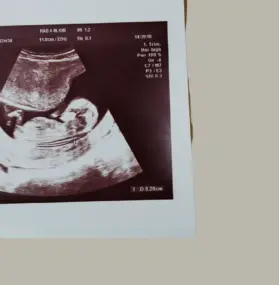- by Carrie Shaw
- on September 9, 2025
(Not a reader? Take a listen instead ⇓)
“Behold, the virgin will be with child and will give birth to a son, and they will call Him Emmanuel” (which means, “God with us”)” | Matthew 1:23, BRB
Scripture tells of a crowded family home in a bustling ancestral town, set at the southern end of the Judean hills. Filled to the brim already, perhaps with relatives from both near and far, there was no room in the guest quarters for the additional arrival of a heavily pregnant Mary, accompanied by her fiancee Joseph.
Exhausted from the arduous travel to Bethlehem, necessitated by the tax decree from Cæsar Augustus (Luke 2:1), Mary and Joseph found space in the ground floor family room with Joseph’s extended family; a comfortable, homely room filled with hollows of straw, and where the animals also slept and fed.
Surrounded by family, and labouring in a crowded, warm, Israeli home like many other women before her, Mary gave birth to her first child, a son. His name was to be ‘Jesus’ (meaning ‘Yahweh will save’) and he was born to ‘save his people from their sins’ (Matthew 1:21).
“A thrill of hope, the weary world rejoices, for yonder breaks a new and glorious morn…” | O Holy Night
The Necessity Of Jesus’ Humanity
It was an important and necessary reality that Jesus shared in our humanity; a connection which he derived from his mother, Mary.
Jesus’ redemptive work on behalf of humanity was deeply connected to his own humanity. His ability to sympathise with us and to reconcile on our behalf springs from a complete understanding of what it is like to be human; with all our doubts, fears, temptations, and failures. He understood humans because he was human.
The story of his birth impresses upon us just how similar he was to us in every way, even to the unremarkable ordinariness of his birth.
Like countless babies before him, he was born surrounded by noise and bustle, sweat, blood, and tears. Relatives would have crowded around to proudly admire (what was assumed to be) Joseph’s firstborn son. Mary would have comforted the newborn’s hungry cries by pressing him closely to her breast. His arrival was, on one hand, a thoroughly human affair, recognisable the world over.
“There are three creation stories of the creation of humanity in the Bible. The first is that humanity is made in the image and likeness of God. The second is that a human is formed from the dust of the earth and the woman is taken from man: she is flesh of his flesh. The third is that humanity is reborn through a saviour; who is born of a woman, and he is flesh of her flesh…Jesus is made of her, not just in her. He is made from her and not just through her. How else could Jesus be connected to the line of David [King of Israel] through Mary unless the baby was truly hers, albeit born of the Spirit. This physical connection to Mary is the basis of the story of salvation, the proof that our own flesh, our souls and bodies, can be redeemed and cleansed and resurrected.” | Lucy Peppiatt
Yet, despite the seemingly unremarkable circumstances of his birth, God was, in fact, doing something completely remarkable and unique in and through this child. This newborn babe was the Word-Made-Flesh, God-With-Us, and his birth was an event that would change the course of human history forever.
The Darkness Of The Human Heart
When God originally created this world and the humans that inhabit it, He did so with purpose and intentionality. He wanted humanity to choose to ‘walk with Him‘, to want to be like Him, and to partner with Him in His glorious mission to fill the earth with His glory.
Yet much of the Bible is a repetitive narrative of human failure, telling over and over again of the inability of humans to live as the perfect image-bearers that God had intended.
Disobedience of God’s directive in the very beginning and the first act of sin in the world brought about its awful consequence for humanity; a sentence of death, and being sent from God’s presence in shame and disappointment. Instead of beauty, the first humans received a crown of ashes and instead of joy, they experienced loss and mourning.
Not only this, the spiritual heart of humanity became darkened and sick, in desperate need of healing and regeneration. Humanity died that day – not physically or immediately, but spiritually. Our union with God was severed and we became separated from God’s presence. Seeking our own will at the expense of God’s glory, we were incapable of living the glorious life He had intended for us. And, just as we have inherited physical life from our parents, so too we have inherited spiritual death.
“Made for spirituality, we wallow in introspection. Made for joy, we settle for pleasure. Made for justice, we clamour for vengeance. Made for relationship, we insist on our own way. Made for beauty, we are satisfied with sentiment.” | N T Wright
Every human who is born comes into the world physically alive but spiritually dead. Without our spiritual connection with God, we are nothing more than ‘dead men walking’, living in darkness and far from the eternal life God intended for us.
“And I know that nothing good lives in me, that is, in my sinful nature. I want to do what is right, but I can’t.” Romans 7:18, NLT
The heart is deceitful above all things, and desperately sick; who can understand it? Jeremiah 17:9, ESV
“This is an evil in everything that is done under the sun: There is one fate for everyone. Furthermore, the hearts of men are full of evil and madness while they are alive, and afterward they join the dead.” Ecclesiastes 9:3, BSB
“For the desires of the flesh are against the Spirit, and the desires of the Spirit are against the flesh, for these are opposed to each other, to keep you from doing the things you want to do.” Galatian 5:17, ESV
The Necessity Of Jesus’ Divinity
But God, in His infinite love, did not leave anything to chance in His plan of saving and redeeming humanity.
Despite human failure and many, many detours in this story, God has declared that His purpose will not be thwarted. He will accomplish what He intended for His creation, even to His own personal cost, as it turns out.
“I declare the end from the beginning and ancient times from what is still to come. I say, ‘My purpose will stand, and all My good pleasure I will accomplish.’” | Isaiah 46:10, ESV
Jesus was born to ‘save his people from their sins’; to break the power of death and to reconcile all of humanity back to God. Yet no ‘ordinary human’ could possibly have achieved this remarkable feat.
The child of both a human father and a human mother would have resulted in the kind of human we see around us every day and indeed within our own selves – a person who is subject to the ravaging effects of sin and governed by a heart that is, in its deepest recesses, at enmity with God. This kind of human couldn’t possibly have overcome sin or lived, without fault, as God’s perfect image-bearer. Nor could this kind of human have defeated the power of death by virtue of living a sinless life, perfectly obeying God’s moral law.
Jesus was human, born of a human mother. However, prophecies that spoke of the coming saviour made it clear that he was to be born of a virgin, with no human father involved in his conception (Isaiah 7:14). Instead, the Holy Spirit moved and, in the same way that creation sprang into being at God’s command (Genesis 1), so too it was the animating force for the conception of God’s Son. “God said” and it was so!
“The law of Moses was unable to save us because of the weakness of our sinful nature. So God did what the law could not do. He sent His own Son in a body like the bodies we sinners have. And in that body, God declared an end to sin’s control over us by giving His Son as a sacrifice for our sins.” | Romans 8:3, NLT
“Since the children have flesh and blood, he too shared in their humanity so that by his death he might break the power of him who holds the power of death–that is, the devil.” | Hebrews 2:14, NIV
“The Word became flesh and made his dwelling among us. We have seen his glory, the glory of the one and only Son, who came from the Father, full of grace and truth” | John 1:14 NIV
John, the author of the fourth gospel account in the New Testament, deliberately parallels the Genesis account when beginning his record of this pivotal and distinctly unique moment in human history; the arrival of Jesus the Christ, the Son of God.
He tells us that ‘in the beginning was the Word (logos), and the Word was with God, and the Word was God’ (John 1:1). The use of the Greek word logos here is frustratingly difficult to adequately convey in English by a single word. Literally meaning ”I say”, it’s not used for ‘a word’ in the grammatical sense; the term lexis (λέξις, léxis) would have been used in that instance. However, both logos and lexis derive from the same verb légō (λέγω), meaning “(I) count, tell, say, speak”.
That ‘Word’, and all that is contained by the expression, became flesh and ‘dwelt among us’. He was ‘God-With-Us’; anyone who saw him saw all the radiance of God’s glory; the exact representation of His being and the imprint of His nature (Hebrews 1:3, John 14:10-11).
Paul the Apostle tells us that Jesus, who was in the very nature of God, emptied himself and took the form of a servant, made in the likeness of humans that sin (Philippians 2:6-7). He became the representative of us all and in his human body, the war against sin and death would be waged and won.
A New Creation In Jesus
All of human history had been leading up to this moment, when creation would be reconciled and redeemed back to God and to the purpose for which it had been created. Through his human descent, Jesus was connected to us all, right back to the garden of Eden; and what was done by one man (Adam) to the detriment of us all, would be reversed in another, ‘the second Adam’, who was to be a life-giving Spirit (1 Corinthians 15:45).
Other places in scripture, particularly the writings of Paul the Apostle, affirm that the revelation of God’s original plan of creation, the redeeming, recreating, and re-ordering of all things, together with the reconciliation of creation to its Creator, all find their true and most meaningful significance in Jesus Christ, the Word-Made-Flesh (Ephesians 1:3-10; Colossians 1:15-20; Hebrews 1:1-3; Romans 16:25-26; 1 Corinthians 8:6). The invisible God was now revealing Himself visibly through His Word-Made-Flesh, in whose hands the world and all that is therein, has been placed. (John 3:35; Ephesians 1:10; Colossians 1:20).
In Jesus Christ, we find the reasons for truth and life. In him, we find the source of life and the light of humanity, the light that shines in the darkest places of the human heart, bringing peace to the chaos and creating order and beauty again (John 1:4, 2 Corinthians 4:6).
In the unique person of Jesus, God was doing a completely new thing; bringing about a new creation and restoring again the hearts of humanity to a whole relationship with Him (Isaiah 43:19, 2 Corinthians 5:17).
“For God, who commanded the light to shine out of darkness, has shined in our hearts, to give the light of the knowledge of the glory of God in the face of Jesus Christ.” | 2 Corinthians 4:6, NKJV
Focusing On The Miracle
Jesus was both the son of a human mother and the son of a divine Father; the human and the divine embodied within the one individual. He was born specifically and uniquely, after centuries of human failure, that, in him, the Creator might redeem His creation. He was the “Word-Made-Flesh” – the ‘one and only of his kind’, a man, but not merely a man and in him, ‘the entire fullness (completeness) of God’s nature dwells bodily’ (Colossians 2:9).
Theologians have deliberated about this seemingly impossible reality for centuries. As early as 300 hundred years after Jesus’ birth, a council of Christian bishops convened in the city of Nicaea (now known as the town of İznik, in modern-day Turkey) to decide on the longstanding theological debate regarding the nature of Jesus and his relationship to God.
Settlement of the debate was affected by the creation of the Nicene Creed, a statement of beliefs now widely used in Christian liturgy. With the creation of the creed, a precedent was established for subsequent local and regional councils of Bishops to create statements of belief and canons of doctrinal orthodoxy. The intention was to define unity of beliefs for the whole of Christendom.
And yet, the arguments still rage today. Dialogue tends to grapple with the how (and the answer to this is perhaps well outside our paygrade), focusing on the need to fully explain and document in what way the person of Jesus was the Word-Made-Flesh. Quite often, the miraculous reality is lost in the foray of dogmatic contention.
What is often also lost is an acknowledgment and rejoicing in the why – that only the Word-Made-Flesh could truly and completely redeem humanity. Only God stepping personally into the drama and chaos of humanity through the sending of His Son could solve the dilemma of sin and death that we all share in. And this miracle of redemption and rescue was achieved through God’s only Son, both human and divine.
“That which was from the beginning, which we have heard, which we have seen with our eyes, which we looked upon and have touched with our hands, concerning the word of life — the life was made manifest, and we have seen it, and testify to it and proclaim to you the eternal life, which was with the Father and was made manifest to us. (1 John 1:1–2) and God was manifest (appeared) in the flesh.” (1 Timothy 3:16)
“Comfort, comfort my people, says your God. Speak tenderly to Jerusalem, and cry to her that her warfare is ended, that her iniquity is pardoned, that she has received from the LORD’s hand double for all her sins. A voice cries: “In the wilderness prepare the way of the LORD; make straight in the desert a highway for our God. Every valley shall be lifted up, and every mountain and hill be made low; the uneven ground shall become level, and the rough places plain. And the glory of the LORD shall be revealed, and all flesh shall see it together, for the mouth of the LORD has spoken. Go on up to a high mountain, O Zion, herald of good news; lift up your voice with strength, O Jerusalem, herald of good news, lift it up, fear not; say to the cities of Judah, “Behold your God!” Behold, the Lord GOD comes with might, and His arm rules for Him;” | Isaiah 40:1-5, 9-10, ESV
Nature + Nurture
Who we are as individuals is derived from both genetic predisposition (‘nature’) and environmental factors (‘nurture’)
The reference to ‘nature’ is the idea that human behaviour can be considered to be the result of ‘pre-wiring’; information or characteristics that are determined by our genes. These biological factors influence our predisposition to certain traits and behaviours and are determined at a gene level, over which we have no personal ability to control.
The reference to ‘nurture’ relates to the idea that the environment a person is exposed to, either prenatally or during a person’s life, will influence and affect the development and psychology of an individual, and therefore their resulting behaviours and traits.
Studies conducted in the twentieth century on twins who had been separated at birth concluded that human behavioural development is affected by both nature and nurture – both an individual’s natural disposition and the environment in which they are raised.
When we consider the impact of this in relation to Jesus, both son of man and son of God, at once human and divine, we understand certain passages of scripture in a new light and are amazed at the mastery of God in relation to the remarkable reality of His son.
Firstly, the genealogy of Jesus is important. It’s one of the first things that the gospel of Luke makes known – that is, the genetic origins of the one who is to be called the Christ.
He is born to a young woman descended from the family of the great King David, a woman favoured of the Lord and deeply devout and spiritual in her faith (Luke 1:28, 47-55). Joseph, the man who would become his earthly adoptive father, was also ‘a good man’, honourable, faithful, and generous-hearted (Matthew 1:18-19). Joseph was not willing to put Mary through public disgrace, despite the initial assumption of scandal that surrounded her pregnancy.
Yet Jesus is also born in Bethlehem, an insignificant village in Judah (Micah 5:2, Matthew 2:6) to a poor family who could only offer the most inexpensive of offerings at his birth (Luke 2:24, Leviticus 12:8)
There was nothing in his circumstances that any human could boast in and he certainly wasn’t born into the privilege, wealth, or status that we might normally associate with royalty.
Everything about his arrival was so counter-cultural to expectation that it’s no wonder he was overlooked and discounted by even his own peers and fellow countrymen. By all accounts, he was nothing special – the son of a country carpenter – if even his actual son, as the whispers rumoured a different story – and, in this way, he represents every single one of us.
In his humanity, he felt everything that we feel, our stresses, fears, struggles, heartbreaks. He understood what it was like to be poor, rejected, and marginalised. He understood oppression and abuse of power. Yet he also understood the joy of our humanity; love, family, celebration, hope. He appeared to be completely ordinary and in his complete human ordinariness, he could not have represented us better (Isaiah 53:2).
Yet despite outward appearances, he was anything but ordinary. In nature, his heart belonged to His Father (John 6:38, John 4:34) and his mission was to do his Father’s will, accomplishing the work that He had given him to do (John 6:38). In him, God was glorified and in him ‘mercy and truth have met together; righteousness and peace have kissed each other’ (Psalm 85:10-11).
“This Good News is about His Son, our Lord Jesus Christ. In his human nature, he was a descendant of David. In his spiritual holy nature, he was declared the Son of God. This was shown in a powerful way when he came back to life.” | Romans 1:3-5 (GW)
In Jesus, we see everything that God is.
Scripture could not be any clearer that the victory over sin and death was going to be God’s, accomplished through the sending of His Son. Sent in the likeness of all of humanity, but in whom dwelt all the fullness of God, only the uniquely special Son of God would be able to overcome and defeat our greatest enemy.
There is a world of meaning in what it was to be “the Son of God”, ‘begotten not created’, ‘spiritual, not earthly’. Jesus was enough like us in the ways that mattered to defeat sin and overcome death on our behalf but also enough not like us that a victory could and would be won, and that this victory would be God’s, not ours.
With the arrival of Jesus, the Word-Made-Flesh, God-With-Us, we are being invited to think about all that ‘God’ is in new and breathtaking ways. We are challenged to comprehend the reality that all the goodness and love and compassion and righteousness and truth and mercy that God is took up residence amongst us. Jesus confirmed that those who had ‘seen him, had seen the Father’ and that ‘I and my Father are one’. He was everything that is God, expressed in human form. God had arrived, in the person of His Son (Isaiah 40:4, Mark 1:3).
Theology | Faith Seeking Understanding
This article is obviously referencing core biblical theology in relation to salvation, redemption, the nature of Jesus, and the truth of God and who He is. However, we should avoid the temptation to merely get ‘stuck’ in a particular doctrinal position or viewpoint on the subject. To do so is to ignore the reality that not everything that is true can be fully explained, and that the goal of theology is not to acquire knowledge, for its own sake, but to gain understanding that not only informs but transforms our faith.
The word ‘theology’ literally means ‘thinking about God‘. One classic definition of theology was given by St Anselm. He called it ‘faith seeking understanding‘ and for many this is the true function of Christian theology.” | Paul Badham
Our theology – what we think about God – is important. How can we begin to know and understand ourselves and our place in this expansive creation if we have no sense of the One who made us and the purpose for which we’ve been made?
However, a robust and living theology will spring from understanding and experiencing who God is and what He has done for us, in Jesus, not simply by giving agreement to a statement or creed of ‘theological beliefs’.
By affirming the biblical narrative, that we are saved by grace through faith alone, we begin a journey towards a deeper understanding of who God is, which only grows as our Christian life progresses. Our theology is, perhaps then, best described as an expedition of discovery, rather than a destination at which we arrive. We discern more and more about the heart and mind of the Creator as our life progresses. This knowing and experiencing – this walking with God – renews us day by day to become more like the crucified Lord we follow.
Jesus was the exact representation of God and the very imprint of His nature (Hebrews 1:3, John 14:10-11), the Word-Made-Flesh who took up residence amongst us (John 1:1-14).
To know God is to know Jesus, whom He sent (John 17:3), and, therefore, the true starting point of our theology as Christians is looking to Jesus and, fundamentally, to God, in Jesus, crucified. It is in this that we see the extent to which God was prepared to go in order to rescue and redeem us and why Jesus, and Jesus alone, truly human and truly divine, was the hope of the world.
In your pursuit of knowledge, don’t lose sight of this miracle.
“The Son is the image of the invisible God, the firstborn over all creation.” | Colossians 1: 15, ESV
“The Son is the radiance of God’s glory and the exact representation of His nature, upholding all things by his powerful word. After he had provided purification for sins, he sat down at the right hand of the Majesty on high.” | Hebrews 1:3, ESV
“His divine power has given us everything we need for a godly life through our knowledge of Him who called us by His own glory and goodness.” | 2 Peter 1:3, NIV






